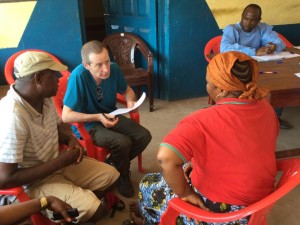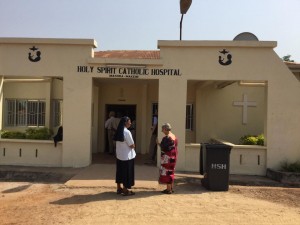 I have been in Sierra Leone for some weeks now, in the diocese of Makeni (Sierra Leone), having been entrusted with pastoral care by the Apostolic Administrator Fr. Natalio Paganelli, a Severian religious from Bergamo.
I have been in Sierra Leone for some weeks now, in the diocese of Makeni (Sierra Leone), having been entrusted with pastoral care by the Apostolic Administrator Fr. Natalio Paganelli, a Severian religious from Bergamo.
My presence belongs to a project for humanitarian aid organised by the Camillian Task Force – the office of the general curia of the Order of Camillian Religious which coordinates initiatives in areas struck by natural disasters. Our Order is not present in a formal and institutionalised way in Sierra Leone – it is here to respond to the emergency generated by the Ebola virus and we have begun our cooperation with the local diocese through a series of programmes that were jointly agreed upon.
The goals of the project are to reopen the Holy Spirit Hospital which is owned by the diocese, to provide psycho-social support to the victims of the virus and to those who have survived it, and to produce programmes with a view to dealing with similar epidemics. These are the overall aims of our action in Sierra Leone. However the fluidity of the situation requires a flexible approach to achieve their implementation. Indeed, it is quite common to encounter NGOs which, after receiving funds to fight against the Ebola virus, have had to revise their programmes because the holding centres and the treatment centres have been rapidly emptied of people and the forecasts for the immediate future are that there will be a complete end to this epidemic.
I will simply offer you here some comments or impressions of mine at the end of this first period of my presence in Makeni.
Sierra Leone is held to be one of the poorest countries in the world according to some general indicators of development and wellbeing. It has just gone through a civil war which destabilised the country and corrupted and changed some of its cultural models, establishing social fears and forms of civic suspicion which had hitherto been unknown.
The Ebola virus, for its part, came as an invisible killer, transmitted through some of the commonest events of social life: physical contact in relationships and the socio-religious rituals that accompany funerals. It is by now a well-known fact that the virus is transmitted through body fluids (saliva, tears, sweat…) and as such the practice of washing, kissing and paying respects to the body of a dead loved one became one of the principal causes of a very large number of infections.
Suddenly, immediate relational practices which had become consolidated over time, such as a hug, a handshake or taking part in a funeral, were outlawed and declared dangerous, with a consequent alteration of a deeply rooted culture. It is even difficult for me to get used to not shaking hands when this gesture is offered; to using soap in the form of gel to clean my hands; and to continually washing my hands before going into public places – churches included. However, despite these restrictions and precautions – which people show that they have learnt – one does not notice any putting into plaster of African society. Life continues calmly and in a relaxed way, marked by a lazy passing of the hours, without frenzy or impatience, and people never stop smiling. One calmly walks through the streets, obviously enough being careful not to show one’s wealth or moving around at night. An ability to absorb the gravest disasters without changing or becoming desperate, and with calm and serenity, seems to be typical of this culture.
 Every disaster – above all if it has an impact on the mass media – activates an enormous flow of money. This is also evident in this part of the world where the SUV are countless, like, indeed, the enormous vehicles which the large (but also small) organisations equip themselves with to meet their logistical needs. Hundreds of coloured initials are to be seen on the streets, giving each other appointments at the various meetings, running behind unfailing programmes and meeting in the evening in the few hotels in the centre: the usual life of the cooperation figure – tiring but also very well paid! Often disasters are a great opportunity for some people!
Every disaster – above all if it has an impact on the mass media – activates an enormous flow of money. This is also evident in this part of the world where the SUV are countless, like, indeed, the enormous vehicles which the large (but also small) organisations equip themselves with to meet their logistical needs. Hundreds of coloured initials are to be seen on the streets, giving each other appointments at the various meetings, running behind unfailing programmes and meeting in the evening in the few hotels in the centre: the usual life of the cooperation figure – tiring but also very well paid! Often disasters are a great opportunity for some people!
The situation of Sierra Leone – like that of other nations struck by disasters – is endemic and the resort to action during the epidemic generated by Ebola is a mere tampon for a system which at a more overall level is sick. The true solution is the modernisation of services, the updating of personnel, and empowerment – that process of growth, both of the individual and of groups, based upon increasing self-esteem, self-effectiveness and self-determination in order to bring out latent resources and to lead the individual to knowingly acquire his or her potential – of the existent and not delegation to institutions outside the system. Some foreign activists present in the country, who have even been here for over thirty years, remind us of this with passion. It is not through activity involving substitution or through the draining of resources that this situation will be resolved, but, rather, and in opposite fashion, through support for the existing structures and the people within them who often work with a great spirit of sacrifice, as they did before Ebola became a first-page subject for the mass media!
Br. Luca Perletti – Camillian Religious














Camillians on Facebook
Camillians on Twitter
Camillians on Instagram